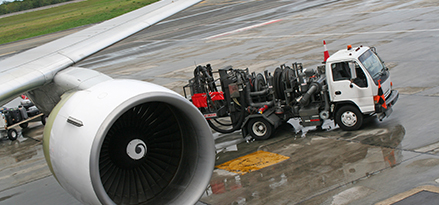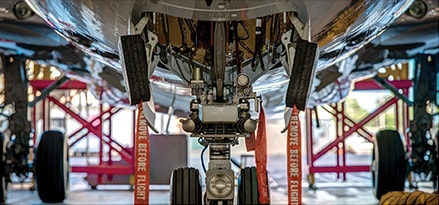Leadership in a field as demanding as the aviation industry requires a steadfast commitment to consistency. For ExxonMobil, this extends beyond providing the highest quality fuels, lubricants and greases; it’s also about ensuring they’re supported by people who know them inside and out. Tom Hitchner is one such expert, plying his extensive knowledge built over 34 years with the company to keep quality up and customers flying smoothly.
We caught up with Tom to learn about his background with the company and his progression from racing lubricant formulator to his current role in aviation.
How long have you been in your current role, and what does it entail?
I've been a technical advisor for the last seven years for aviation units, and that covers jet oils, hydraulic fluids and greases. The role is to provide technical support for manufacturing, for customer problem solving, and providing marketing claim support for our products. It also involves managing quality control with our manufacturing organizations and providing technical support for OEMs and customers.
What did you study in college and what were your career ambitions?
I went to a college in Philadelphia to study mechanical engineering and started with ExxonMobil immediately after graduating in 1988. My main objective as an engineer was to work with automotive engines, but also machinery in general: a lot of my experience in college was related to lubricant systems design and designing bearing systems—things that are part of machines you use in automotive, industrial and aviation.
So, I started my career as a testing engineer working in automotive, developing new Mobil 1 formulations. My job was to coordinate and test new synthetic engine oil formulations. I did that for several years, and then I became a formulator for Mobil 1 and did racing support for NASCAR and CART, providing trackside support for the lubricants that they used in those racecars. After that, I worked in industrial lubricants for a while, and then I worked on one of our Formula 1 programs, Toyota Formula 1, for five years and led that program.
Then I transitioned into what they call a strategic OEM account: Caterpillar, in this case, where I worked for several years supporting that business. Around 2016 I joined aviation as a technical advisor, OEM advisor, and global advisor for marketing, and that's what I've been doing since.
Why did you transition to the aviation division?
It was one of those situations where I had been working for the company for 20-plus years and had experience in basically all the product areas. I worked with Formula 1 engines that are really out there in terms of performance requirements. I worked designing different types of hydraulic fluids for industrial, so I had a lot of knowledge base in that area. And then I worked a lot with greases for racecars and commercial applications like Caterpillar. Those are all the product areas that are in aviation.
And there’s a lot of similarities between Formula 1 and aviation. F1 engines are running at extremely high RPMs and using specialized lubricants; jet engines are kind of similar in that they have really high thermal requirements and they’re running at extremely high speeds. In fact, some of the technology that you would use in a jet oil can kind of translate into a Formula 1 race engine where you're running ridiculously high RPMs and trying to keep things cool and keep things from wearing out. So, in a way, the Formula 1 experience dovetailed nicely into the aviation realm in terms of product formulation and performance characteristics. So, that’s kind of how I got led into the aviation design area.
Also, I had a lot of experience working with OEMs, working with external machine builders for Formula 1 and as the strategic account technical advisor with Caterpillar. So, when I went into the aviation advisor role, I had a base of experience working with OEMs, giving them technical advice, and helping them with their technical challenges.
And, I liked the technical challenge of aviation. The main requirement there is safety: you have to have 100-percent flawless execution for aviation. If we make a mistake or give a wrong piece of advice, we wouldn't want that to lead to some sort of safety concern. We want to help the OEMs, want to help the customers, but we always want to do it in a flawless way, so that there's always 100-percent safety for the aircraft. So, having somebody like me and the other guys on our team who have a broad experience base in a lot of product areas that are relevant to aviation is really helpful.
What are some prominent aviation projects you've worked on so far, and what are you working on now?
The main objective since I've been in this role is finalizing all the approvals for Mobil Jet Oil 387, which is the most state-of-the-art jet oil that we have, and probably the most state-of-the-art jet oil that's in the industry. It's a long process to have a jet oil approved for all the various OEM engines that are out there. So, over my tenure with the aviation division, we probably gained approvals on half a dozen different engines from various manufacturers, and we're in the process of finalizing the last of the engine approvals within the next couple of years.
From a development standpoint, we have some new products that we're trying to get into the market. We developed a new grease, Mobilgrease 58, and again, the challenge with aviation is it's a difficult process to gain a new product approval with the OEMs. Maybe not quite as intense as jet oils, but the overall process is a challenging one, and we’ve been working with Airbus and Boeing to gain the approvals. And, we’re always trying to look for next-generation products to fill out our portfolio and give us a technical advantage that customers can look for—maybe a new kind of jet oil or a new kind of helicopter transmission oil.
There were also a lot of challenges related to the pandemic, especially with the preservation of parked aircraft. Jet oils are sensitive to storage when the equipment is not being used, so we worked really closely with a lot of the OEMs to help them understand what to look for in the lubricant and what kind of testing they should do. Then, when they brought the airplanes back into service, we helped to analyze the issues behind any hiccups and make sure they were able to get the planes back in the air in a safe manner.
What's your favorite thing about your role?
My favorite thing about aviation is that it’s sort of the pinnacle of lubricant technology. It's very specialized and there are not very many other companies participating in this kind of product offer, because it has a lot of sensitivities. It's a difficult business to manage. The technical requirements are very high, and so are the risk levels. And frankly, I'm an engineer and I just love the engineering aspects associated with aviation.
Honestly, I plan to stay in this position for the duration of my time at ExxonMobil. I think it's one of those positions in our portfolio of business areas that benefits from consistency—having people in place who are there for a while that the industry gets to know. It’s important for customers to be comfortable and trust you in that position. It takes time to build that reputation and build the knowledge base, so it's good to maintain a certain consistency of more technical specialists.
What do you see as the primary challenges—and opportunities—facing aviation lubrication over the next 5-10 years?
With respect to the future, I think the biggest challenge will be to understand the lubrication requirements for more sustainable aviation technology. As aircraft evolve to use more electrification, hybridization, different fuels such as hydrogen and SAF, and new efficient airframes, the demands on the lubricants will likely change. New technology is directly tied to aircraft safety and new regulations will need to evolve to encompass new designs. ExxonMobil needs to be engaged in the development of these new aircraft designs to support the performance and safety of the aircraft. ExxonMobil is well positioned to lead the development of new formulation technology to meet these new lubrication requirements and enable more sustainable aviation for the future.

